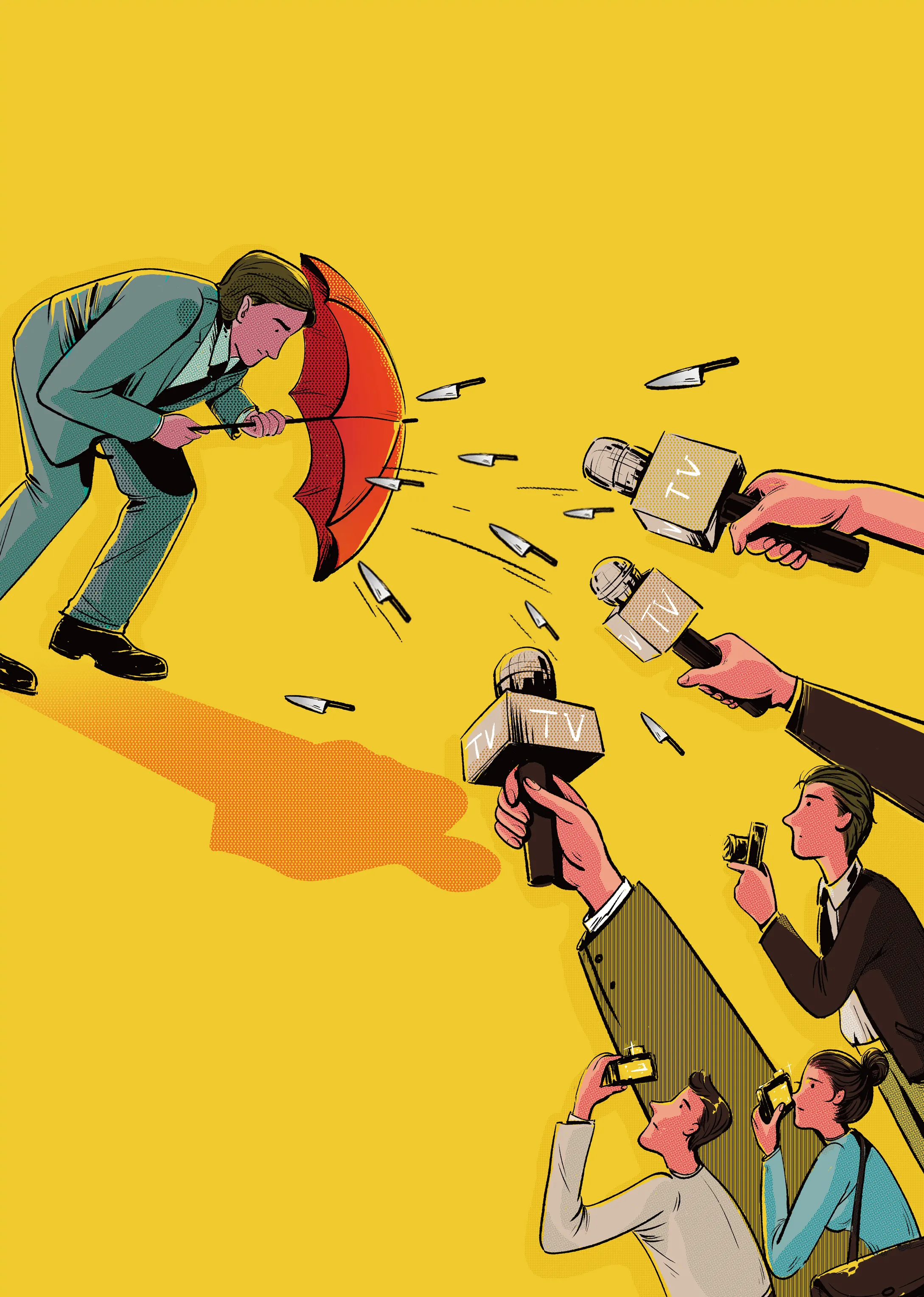Crisis Talk
2023-09-15BySiyiChu褚司怡
By Siyi Chu (褚司怡)

Illustration by Wang Siqi
How (not) to handle a public relations disaster in Chinese
危机公关套路大揭秘
A rat’s head found in cafeteria food might have seemed like the biggest public relations scandal an organization could ever face…but somehow, the administration of the Jiangxi Industry Polytechnic College managed to make a disgusting situation worse.
On June 3, two days after a student shared a video of finding a suspiciously rat-headlike object in his food, the college argued the video’s “反映内容与事实不符 (fǎnyìng nèiróng yǔ shìshí bùfú, content does not correspond to facts)” and that the buck-toothed, bewhiskered object was in fact a piece of duck’s neck, a relatively normal food item eaten in parts of China.
When netizens refused to buy the explanation,the school and, later, the local authorities doubled down on the denial, until finally an investigation by higher-up officials revealed it was indeed a rat’s head.
Netizens dubbed the college’s public relations strategy in this crisis as “指鼠为鸭 (zhǐshǔwéiyā,calling a rat a duck),” a nod to the idiom 指鹿为马 (zhǐlùwéimǎ) derived from an ancient story in which a powerful chancellor claimed that a deer gifted to Qin Shi Huang, China’s first emperor,was actually a horse.Other officials, fearful of the chancellor’s influence, all agreed with the obvious lie.
Deliberately confusing right and wrong is but one strategy that companies, institutions, and celebrities adopt to manage public relations crises, some of which pay off better than others.
Playing victim
One way to make a denial of a scandal even more effective is to play the victim, hoping to make the public believe that it’s you, not the people you supposedly wronged, who deserve their sympathy.
Singer and actor Cai Xukun, for example,recently denied the allegation that he forced a woman he’d impregnated to get an abortion.Cai’s PR team want the public to believe that the scandal is merely rumor-mongering:
I ask certain social media accounts to please refrain from spreading or believing in rumors.
Kěnqǐng xiāngguān zìméitǐ bú xìn yáo、bù chuán yáo.
恳请相关自媒体不信谣、不传谣。
Some accused parties also cry they were被搞了 (bèi gǎo le, being set up) in the face of criticism—specifically, that some enemies hired 水军 (shuǐjūn, water army),or paid social media users, to leave negative comments about them.
A celebrity (or usually, their agents or lawyers) might also claim they will resort to法律武器 (fǎlǜ wǔqì, literally “weapons of law”) to shore up their claim of innocence,making the public believe they must be earnest if they’re willing to use legal means to protect their reputation.
But sometimes turning to the authorities can backfire.This happened in 2021 with the mother of disgraced singer Kris Wu,who reported Du Meizhu, the woman who accused her son of sexually assaulting her and several other young women, to the police on the charge of extortion.The police instead found evidence to back up Du’s accusations.
Taking the moral high ground
If empty threats or claims of victimhood don’t work, one can always cast doubt on the accuser’s credibility.Last year, when soy sauce brand Haitian came under attack for using more food additives in their domestic products than those they sold abroad, the company responded that additives are safe to eat, and chided consumers for their ignorance:
Using the so-called “double standard”to antagonize consumers and domestic brands not only harms Chinese consumers’confidence, but also severely impacts the international reputation of “made in China”products.
Yòng suǒwèi “shuāngbiāo” lái tiǎoqǐ xiāofèizhě hé Zhōngguó pǐnpái qǐyè de máodùn duìlì, bùjǐn dǎjīle Zhōngguó lǎobǎixìng de xiāofèi xìnxīn, gèng huì yánzhòng yǐngxiǎng “Zhōngguó zào”de shìjiè shēngyù.
用所谓“双标”来挑起消费者和中国品牌企业的矛盾对立,不仅打击了中国老百姓的消费信心,更会严重影响“中国造”的世界声誉。
Predictably, such attempts to lecture consumers from the moral high ground often only enrage the public even more.
Never my fault
In the face of any tragic event, it’s important that a company appear sympathetic:
We are very sorry about this accident, and offer our condolences to the deceased colleague.
Wǒmen duì zhè cì yìwài fēicháng
tòngxīn, duì línàn tóngshì biǎoshì
shēnqiè āidào.
我们对这次意外非常痛心,对罹难同事表示深切哀悼。
However, in some cases—such as in 2022,when a test vehicle by electric car company Nio fell from a third-floor garage and killed two people—this might be followed up by an attempt to deflect responsibility:
We arrive at the preliminary conclusion that this accident is unrelated to the vehicle itself.
Kěyǐ chūbù quèrèn, zhè shì yì qǐ yìwài shìgù, yǔ chēliàng běnshēn méiyǒu guānxi.
可以初步确认,这是一起意外事故,与车辆本身没有关系。
Netizens did not appreciate this explanation, as shown by one response to Nio’s announcement on Weibo:
Truly, the last sentence shows the coldbloodedness of capital.
Jiǎng zhēn, zuìhòu yí jù huà tūxiǎnle zīběn de lěngxuè.
讲真,最后一句话凸显了资本的冷血。
Bite the bullet
Given all the tricks and strategies companies and public figures adopt to rid themselves of responsibilities, sometimes it’s almost refreshing to see a response to a scandal that simply admits fault and expresses regret:
After investigating, the company concludes the problems covered by media reports indeed exist.We will suspend our operations, fix the issues, and inspect the whole company.
Jīng gōngsī diàochá, rènwéi méitǐ bàodǎo zhōng pīlù de wèntí shǔshí, jiāng zhǔdòng tíngyè zhěnggǎi、quánmiàn chèchá.
经公司调查,认为媒体报道中披露的问题属实,将主动停业整改、全面彻查。
The above words came from a public statement by Haidilao, a hot pot restaurant chain, in response to a media expose of the unhygienic,rat-infested conditions in some of their kitchens.In this response now applauded among public relations professionals, the company also detailed concrete steps to fix the problem, even listing the names of the employees responsible for each measure.They also requested further oversight from the public:
We welcome consumers, media friends,and authorities to come to our restaurants to supervise us, and give us feedback.
Huānyíng gùkè、méitǐ péngyou hé guǎnlǐ bùmén qiánwǎng Hǎidǐlāo méndiàn jiǎnchá jiāndū, bìng duì wǒmen de gōngzuò tíchū xiūgǎi yìjiàn.
欢迎顾客、媒体朋友和管理部门前往海底捞门店检查监督,并对我们的工作提出修改意见。
